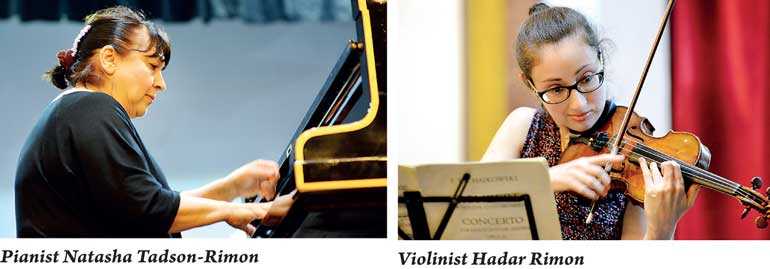Tuesday Feb 17, 2026
Tuesday Feb 17, 2026
Saturday, 21 April 2018 00:00 - - {{hitsCtrl.values.hits}}

By Johann Barke
Last week, the Symphony Orchestra of Sri Lanka (SOSL) featured two wonderful Israeli musicians: violinist Hadar Rimon and pianist Natasha Tadson-Rimon. I am not technically qualified to review this performance. Yet I am moved to recollect the experience of attending it, and to offer some reflections on why my experience was meaningful.
I recall, as I sat in the concert hall – mesmerised by the sheer talent on display – I began to think. This is one of the virtues of classical music. It can form the background to our thoughts. Where much of what entertains us today serves to distract us, classical music offers something unique – clarity of thought.
Some countercultural movements that have emerged around the world compel us to put our devices aside and ‘look up’ to face the world. We are advised to ‘look up’ from our smart phones, and smell the flowers, listen to the birds, enjoy the view. I agree with the gist of such advice, but remain a flagrant offender in technological fixation – obsessively refreshing my email inbox and twitter notifications, and unable to bear unread messages from multiple social media threads. But I am compelled to switch my devices off when attending a classical music concert. For an hour or two, I look up, and I listen to the music.
Many things may prompt us to look up from our screens. Take a gripping film or play for instance. Yet classical music sets itself apart by its capacity to do much more. Our undivided attention at a classical music performance can usher us into a meditative state. Hadar and Natasha, along with the SOSL, offered a moving experience few other genres of entertainment could; they offered a space of serenity for introspection. Before long, we are not merely listening to the music. We are thinking to it.
Tchaikovsky’s violin concerto was performed to perfection. Those pristine moments confirmed that SOSL possessed the competence to accompany a performer of such genius. As Hadar enchanted the audience with her brilliance, the music meshed seamlessly with my thoughts. For the first time that day – possibly that week – I could hear myself thinking.

Why is finding the time and space to think so important, when thinking is so intrinsic to human life? Perhaps it is because modern consumerist life is quietly pulling us in the opposite direction. Instant gratification is often an antithesis to thought. When we are constantly seeking gratification, we are deprived of the time and space to think. When we are deprived of thought, we become spectators in our own lives, swept into a semi-conscious state, ever ready to consume more. This is the vicious cycle many of us are haplessly trapped in. I do not mean to overstate the value of classical music. For me, it is a metaphor for a means of resisting this vicious cycle. If we are indeed to overcome our predicament, perhaps each of us must find our own unique antidote. We must find a momentary remedy to the numbing assault on our senses we encounter in our daily lives. Some of us may meditate, some may sit quietly in a place of religious import, and some may venture out into nature. For some, such as those of us who had the fortune of attending SOSL’s Virtuosi in Concert, classical music offers a vital cure to our chronic condition. Whatever the means, the ends should be to reclaim the time and space to think. After all, we are, and can be, only when we think.
Pix by Shehan Gunasekara